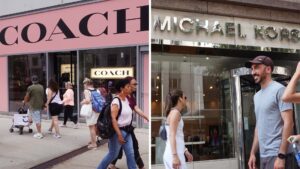Welcome to Extreme Investor Network, where we bring you the latest and most insightful business news to help you make informed investment decisions. Today, we are diving into the recent federal court decision that blocked the acquisition of Tapestry by Capri, two major players in the luxury fashion industry.
In a landmark ruling, a federal judge granted the Federal Trade Commission’s motion for a preliminary injunction to halt the proposed merger between Tapestry and Capri. This decision comes after a brief trial in New York last month, where the FTC argued that the merger would harm consumers by reducing competition and potentially raising prices in the handbag market.
The proposed merger would have combined America’s two largest luxury houses, bringing together iconic brands like Coach, Kate Spade, and Stuart Weitzman under one umbrella with Versace, Jimmy Choo, and Michael Kors. The news of the blocked acquisition sent shockwaves through the industry, with Tapestry’s stock surging 10% and Capri’s plummeting about 50%.
While the reasoning behind the court’s decision is not currently accessible to the public, it is clear that the FTC’s concerns about consumer welfare and market competition played a significant role. The FTC argued that the merger would make affordable handbags less accessible and could lead to a decrease in product quality and innovation.
This ruling is a significant victory for the FTC and consumers seeking access to quality products at affordable prices. As the Biden administration and Vice President Kamala Harris advocate for maintaining competition in the market to keep prices low, the FTC under Chair Lina Khan has been actively blocking mergers and acquisitions that could harm consumers.
At Extreme Investor Network, we understand the importance of staying informed about industry developments and their impact on your investment portfolio. Stay tuned for more exclusive insights and analysis on the latest business news to help you navigate the ever-changing world of investing.

